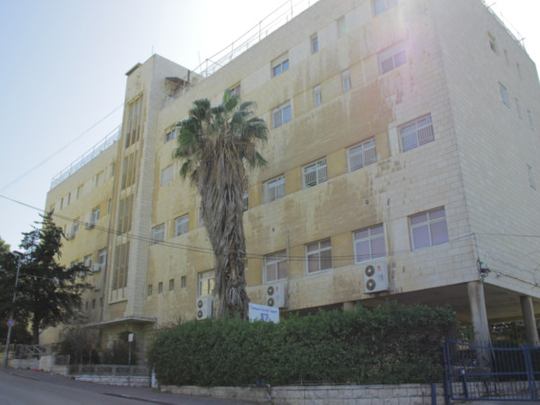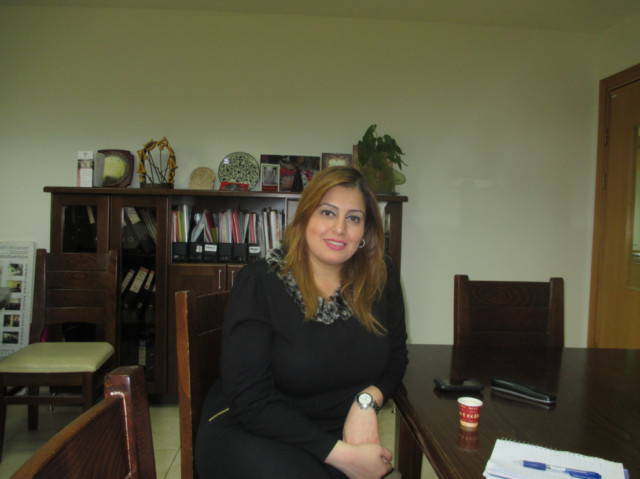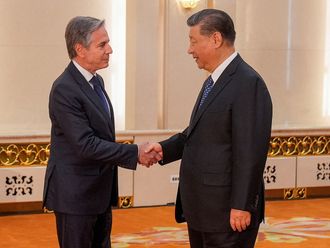
The Young Women’s Christian Association (YWCA) stands as a testament to the steadfastness and resilience of the women of occupied Jerusalem. Established by a group of like-minded Christians in 1893, registered in 1918 during Jordanian rule and having witnessed all the wars and various occupations of the Holy City, it continues to serve the marginalised women of the city and its surrounds.
Sandrine Amer, the executive director of YWCA, who exudes passion and commitment for the work they do, is emphatic: “My family have been here for more than 300 years and I am a pure Jerusalemite. I did my BA in Jordan and my MA in Malta, started as a volunteer, progressed to the board of directors, following in my mother’s footsteps, and in May 2012, I was recruited to head it.”
Amer now has her hands full: “The separation wall has divided the Palestinians. Yet the YWCA, with three associations in Jerusalem, Ramallah and Jericho, continues to oversee multifunctional centres in Jalazoune and Aqabet Jaber Refugee camps. We were the first to work in Palestinian refugee camps, post-Nakba.”
YWCA has developed programmes and projects to empower women by providing education, creating economic opportunities and helping in their struggle for their rights.
Amer says that the YWCA in occupied Jerusalem operates on four thematic areas, the first being Economic Empowerment. A vocational training centre provides women 18 and older with knowledge and skills, to enable them to work in the limited marketplace and earn an income.
“We have upgraded our courses from secretarial to office management, as we believe the former placed women in a subservient role whereas the latter empowers them with skills and confidence in interacting in a positive manner with the management,” Amer says. “Also, after doing an in-depth market study, we now provide multimedia specialisation which includes graphic design, video, photography and montage, using modern media, thus opening up new horizons for women to become self-employed or eventually entrepreneurs.”
Then through its Women’s Rights Programmes, the YWCA advocates social, economic and political rights for women. It has been implementing reach-out programmes among the marginalised women in Shu’fat Refugee camp and in the old city of occupied Jerusalem. “We make them aware of their roles, responsibilities and duties from a gender perspective, their rights to work and education, but most importantly their human rights which our male-oriented society and the occupation does infringe on.”
The third thematic area is the Youth Leadership Training and Civic Engagement, which caters to 15- to 22-year-old Jerusalemites, both men and women. “We now have 80 participants who view the YWCA as their hub,” Amer explains. “We offer them programmes in democratic citizenship, civic engagement and they also do voluntary work in their respective communities.
“In Arts and Creativity, we have a mixed dance group that has taken the popular Palestinian Dabke dance, added a ‘techno’ aspect to it, naming it, ‘techno Dabke’, and formed a dance troupe, ‘Weilalah’. Also, in 2013 we produced three theatrical shows with dance, songs and drama, staged in Ramallah as well. Essentially youth with no drama skills but with an abundance of talent have new horizons opened up for them with space to think freely, without any limitations. They contribute to the text and we believe this is unique and in tune with modern methodology.”
Children Education & Cognitive Learning, the fourth thematic area, enables children to express themselves and improve their thinking and play skills. Occupied Jerusalem is in need of a safe place for children and the YWCA caters to 300 of them, between the ages of 4 and 12.
“Empowering women, we should support their reproductive role by not threatening her work,” Amer says. “In the summer months we organise camps that are art-based to promote creative learning. We have classes with professionals in photography, creative drawing, chess, ballet as well as taekwondo.”
The YWCA has a full-time staff of 20, but they are assisted by many volunteers, students, and NGOs that coordinate activities with them.
On a tour of the YWCA, Amer points out that a sports trainer has her children attending the reading programme, offering a peek at the support structure they have created to empower women in general.
The focus of the EU-funded modern, multimedia laboratory, where the graphic design and photography classes are held, is also to create jobs for women in occupied Jerusalem.
“Half of the first group who graduated from here have obtained jobs and presently we have a programme for the second group,” Amer says. “And the second half of the first group have become self-employed with these skills and that is the general idea — empowerment.”
All the courses at the YWCA are certified by the Palestinian Ministry of Labour and not the Ministry of Education, Amer explains: “We have students who have not passed high school, nobody wants them, though they are talented and creative. It is this segment of society that we cater to, with vocational training that empowers them, with skills to become productive participants in society. Most importantly, our certificates are held in high esteem and the YWCA has a good reputation in Palestine.
“The Office Management students do a one-year study, one-month training and 30 hours of voluntary community service, as the YWCA encourages a sense of giving. We also network with local NGOs and some of our students end up getting jobs there, while others gain valuable experience from the collaboration.
“Most women, who attend the classes here, have to deal with travel constraints within the refugee camps and from the refugee camps to occupied Jerusalem but they somehow make it after much difficulty.
“The YWCA also assists, through their PR Division, graduates with placement while constantly adapting to their needs from past experience.”
During our tour of the YWCA building, we interrupt a computer literacy class. Nadia, one of the students, has this to say: “For 20 years I worked as a receptionist, then I married and had children and now after 20 years I am learning about computers. It’s better late than never. My sisters also studied here. After I graduate, I am going back to work and earn money to provide a better life for my family.”
On Thursdays, the YWCA hosts enrichment and cultural events for students, with entrepreneurs and women leaders sharing their experiences and inspiring the students. Fridays are for activities centred on children and youth.
Amer, at the end of the tour, says, “We constantly suffer from budget deficits, donations are limited and minimal; the mapping for funding has changed as donors are merging and the pool is growing smaller. Overheads are high with Israeli taxes, etc.”
She adds, “Our main issue is payments by students, which we subsidise. If assistance in the form of scholarships for women from marginalised areas of occupied Jerusalem and its surrounds may be obtained, we would indeed be blessed.”
The YWCA may be a Christian association but 99 per cent of its beneficiaries are non-Christians — Muslim Palestinians — and it continues to play a positive role in improving the lives of marginalised women.
Rafique Gangat, author of “Ye Shall Bowl on Grass”, is based in occupied Jerusalem.













